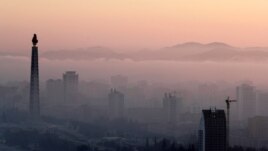04 October, 2019
The word Juche is used almost everywhere in North Korea. But it is a difficult concept for many outsiders to understand.
It is, in many ways, a word for a political ideology. The English translation is usually given as "self-reliance."

FILE - The 170-meter tall Juche Tower and other buildings are seen as morning fog blankets Pyongyang, North Korea, September 8, 2018. (REUTERS/Danish Siddiqui/File Photo)
But to observers of North Korea, Juche can seem more like a religion. It appears to inspire North Koreans and is a representation of state power.
North Korea has often used the term in speeches to the United Nations.
During earlier speeches, the officials called nuclear weapons the "treasured sword" of Juche. The August test of a new rocket launcher was praised as the "rapid development of the Juche-oriented defense industry."
Juche is even used to count the passing years: This year is Juche 108. That is because it has been 108 years since the nation's founder, Kim Il Sung, was born.
The 170-meter-tall Tower of Juche Idea was built in 1982 for Kim Il Sung's 70th birthday. Guide Choe Hye Ok shows visitors the tower. He has a definition he shares with them: "If one believes in the local people, and relies on them, one will get the universe. This is exactly the meaning of Juche."
Some observers believe Juche has gotten new energy under leader Kim Jong Un. He is the third generation of his family to rule North Korea. He has increasingly taken part in meetings with world leaders over his nuclear weapons program and the international sanctions crushing his economy.
Joshua Pollack is a North Korea expert at the Middlebury Institute of International Studies at Monterey in California. He said North Korea has now officially "enshrined ‘self-reliance and self-development'" as the new main idea of the Kim Jong Un period.
The country is heavily dependent on outside aid, however. South Korea, for example, has spent about $5.8 billion on North Korea aid and economic projects through a government program established in 1991. South Korea's Export-Import Bank of Korea operates the program and says the goal is to support inter-Korean relations.
Stephan Haggard is a North Korea expert at the Peterson Institute for International Economics in Washington D.C. He doubts the North's self-reliance, writing: "North Korea has long survived on the largesse of the international community."
Kim Jong Un has made the development of nuclear weapons and economic development the two top issues of his rule. Juche is used to describe efforts toward both goals. There is a debate among outsiders about what, exactly, the term means under Kim's rule.
North Koreans, however, have little doubt.
Kim Chang Kyong is department head of the Social Scientists Association in North Korea and an expert on Juche. He said, "The essence of the Juche idea is that man is the master of his own destiny."
Understanding North Korea, he said, is impossible without understanding Juche. "All the achievements of the country are linked to the idea, which forms the guidelines of the party and state," he said.
As he works to explain Juche, Kim, the North Korean social scientist, compares it to another very Korean word — kimchi, Korean pickled, spicy vegetables. "Kimchi was created in our country. But for us it is just kimchi. Nobody uses another word to describe kimchi," Kim said.
I'm Mario Ritter Jr.
Foster Klug reported this story for the Associated Press. Mario Ritter Jr. adapted it for VOA Learning English. Ashley Thompson was the editor.
________________________________________________________________
Words in This Story
translation –n. taking words from one language and changing them into another language
reliance –n. the state of needing someone else for support or help
sword –n. a long, sharp metal weapon
-oriented –adj. related to
sanctions –n. actions taken, usually through limiting or banning trade, that are meant to force a country to obey international law
enshrine –v. to remember and protect something
largesse –n. the quality of a person or group who gives away money or gifts
We want to hear from you. Write to us in the Comments section, and visit 51VOA.COM.